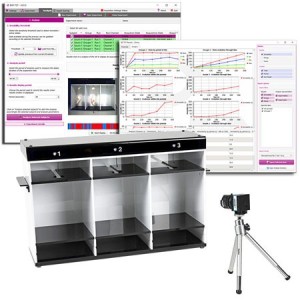Authors
Chabry J, Nicolas S, Cazareth J, Murris E, Guyon A, Glaichenhaus N, Heurteaux C, Petit-Paitel A
Lab
Centre National de la Recherche Scientifique (CNRS), Institut de Pharmacologie Moléculaire et Cellulaire, UMR 7275, Valbonne, France
Journal
Brain Behav Immun.
Abstract
Regulation of neuroinflammation by glial cells plays a major role in the pathophysiology of major depression. While astrocyte involvement has been well described, the role of microglia is still elusive. Recently, we have shown that Adiponectin (ApN) plays a crucial role in the anxiolytic/antidepressant neurogenesis-independent effects of enriched environment (EE) in mice; however its mechanisms of action within the brain remain unknown. Here, we show that in a murine model of depression induced by chronic corticosterone administration, the hippocampus and the hypothalamus display increased levels of inflammatory cytokines mRNA, which is reversed by EE housing. By combining flow cytometry, cell sorting and q-PCR, we show that microglia from depressive-like mice adopt a pro-inflammatory phenotype characterized by higher expression levels of IL-1?, IL-6, TNF-? and I?B-? mRNAs. EE housing blocks pro-inflammatory cytokine gene induction and promotes arginase 1 mRNA expression in brain-sorted microglia, indicating that EE favors an anti-inflammatory activation state. We show that microglia and brain-macrophages from corticosterone-treated mice adopt differential expression profiles for CCR2, MHC class II and IL-4rec? surface markers depending on whether the mice are kept in standard environment or EE. Interestingly, the effects of EE were abolished when cells are isolated from ApN knock-out mouse brains. When injected intra-cerebroventricularly, ApN, whose level is specifically increased in cerebrospinal fluid of depressive mice raised in EE, rescues microglia phenotype, reduces pro-inflammatory cytokine production by microglia and blocks depressive-like behavior in corticosterone-treated mice. Our data suggest that EE-induced ApN increase within the brain regulates microglia and brain macrophages phenotype and activation state, thus reducing neuroinflammation and depressive-like behaviors in mice.
BIOSEB Instruments Used
Tail Suspension Test - Wireless (BIO-TST5)
Keywords/Topics
Depression; Inflammation; Cross-disciplinary subjects ; Mood disorders
Source :

 Pain - Thermal Allodynia / Hyperalgesia
Pain - Thermal Allodynia / Hyperalgesia Pain - Spontaneous Pain - Postural Deficit
Pain - Spontaneous Pain - Postural Deficit Pain - Mechanical Allodynia / Hyperalgesia
Pain - Mechanical Allodynia / Hyperalgesia Learning/Memory - Attention - Addiction
Learning/Memory - Attention - Addiction Physiology & Respiratory Research
Physiology & Respiratory Research











![Dynamic Weight Bearing 2.0 – Postural Module [Add-on]](https://bioseb.com/733-home_default/dynamic-weight-bearing-20-add-on-postural-module.jpg)
























 Pain
Pain Central Nervous System (CNS)
Central Nervous System (CNS) Neurodegeneration
Neurodegeneration Sensory system
Sensory system Motor control
Motor control Mood Disorders
Mood Disorders Other disorders
Other disorders Muscular system
Muscular system Joints
Joints Metabolism
Metabolism Cross-disciplinary subjects
Cross-disciplinary subjects CONFERENCES & MEETINGS
CONFERENCES & MEETINGS 